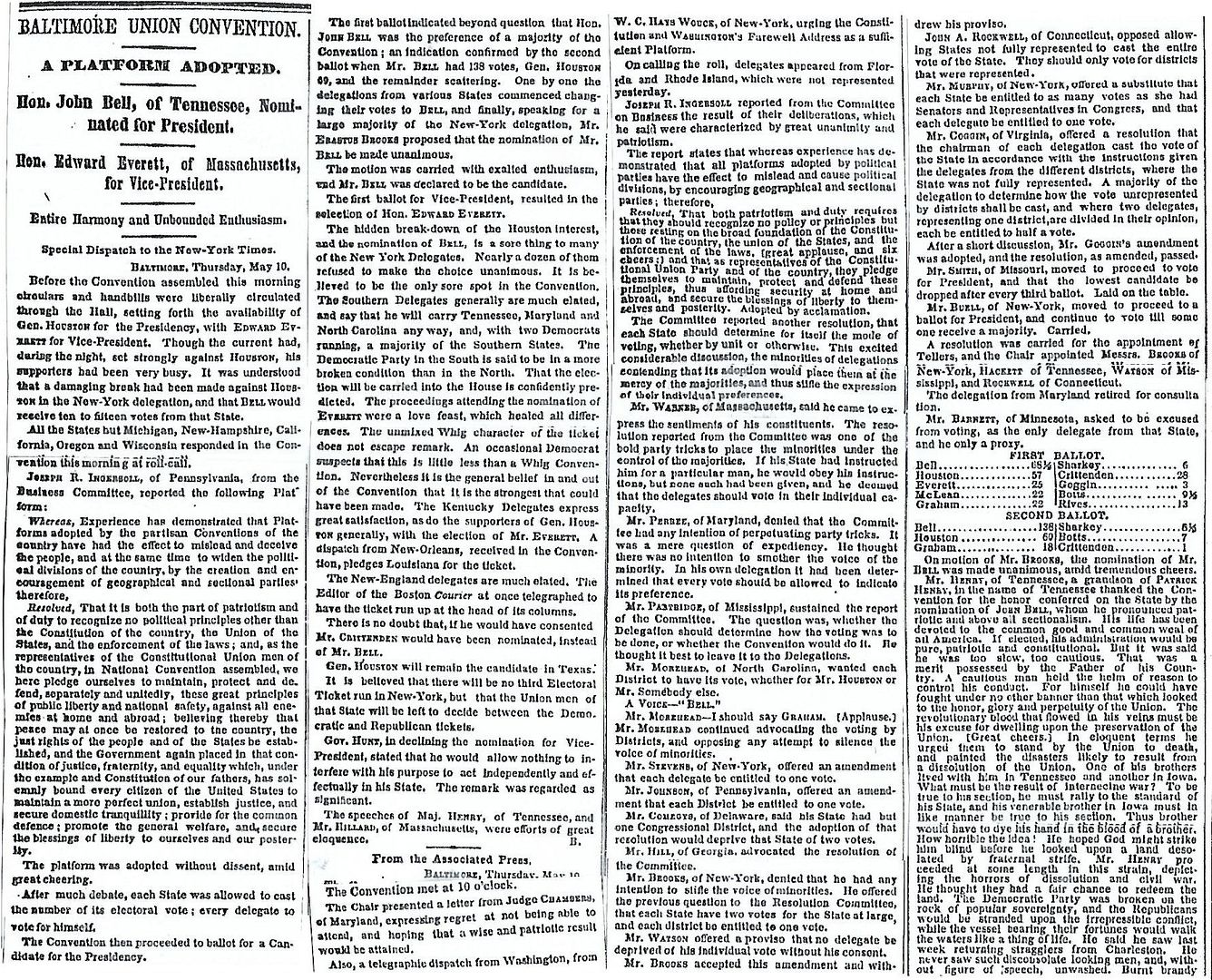



Posted on 05/11/2020 7:16:53 AM PDT by Homer_J_Simpson
Special Dispatch to the New-York Times. BALTIMORE, Thursday, May 10. Before the Convention assembled this morning circulars and handbills were liberally circulated through the Hall, setting forth the availability of Gen. HOUSTON for the Presidency, with EDWARD EVERETT for Vice-President. Though the current had, during the night, set strongly against HOUSTON, his supporters had been very busy. It was understood that a damaging break had been made against HOUSTON in the New-York delegation, and that BELL would receive ten to fifteen votes from that state.
(Excerpt) Read more at nytimes.com ...
First session: November 21, 2015. Last date to add: Sometime in the future.
Reading: Self-assigned. Recommendations made and welcomed.
Posting history, in reverse order
To add this class to or drop it from your schedule notify Admissions and Records (Attn: Homer_J_Simpson) by reply or freepmail.
Sometimes, I think it is regrettable that this ticket carried only three states. We might have avoided a bloody civil war AND put slavery on a path to obsolescence.
Bell was basically a spoiler - idea was to draw enough electoral votes to deny majority candidates (Lincoln, Breckenridge, Douglas)
Election devolved into 2 contests Lincoln-Douglas in North, Bell-Breckenridge in south
Lincoln and Douglas were anathema in south , Repubicans did nt even campaign as would have been lynched
Bell vs Breckenridge in south - Bell to draw votes was forced to declare support for slave code in territories
which made him poison in north
Won in Kentucky, Tennessee, Virginia, came close in Maryland
Objective was draw away enough electoral votes to throw election to House
Everett, the VP candidate was Senator from Mass, hoped to be elected by the Senate and run country while others duked it out in House
Oddly enough, the Breckenridge-Lane ticket was on the ballot in even more northern states. Their best showing outside the slave states was 37.5% in Pennsylvania.
A lot of Northerners did not want to go to war over slavery; neither did a lot of southerners. Both sides were plagued with recruiting problems throughout the war due to these feelings. The cost of the war in treasure alone was more than ten or twelve times the value of the slaves at the market peak.
I've never heard of a Smoky Hill Massacre, so I think the dispatch was right to discredit it. The Smoky Hill River is in Kansas, on the route from St. Joseph, Missouri, to newly founded Denver and the diggings beyond.
What generally happened with the Democrats is that the party machine in the state decided if they favored Douglas or Breckenridge and the Democrats in the state went along with that. The Democrats were divided on the West Coast, so both Douglas and Breckenridge were competitive in California and Oregon. In Pennsylvania, New Jersey, New York and Rhode Island ran "fusion" slates of electors who would vote for Douglas or Breckenridge depending on how things looked when the electors voted. New Jersey voted for a mix of Republican and Democrat electors so Lincoln and Douglas both got electoral votes from the state. Lincoln carried the other three states, but there was a split between the Fusion ticket and Douglas loyalists in Pennsylvania, so it looks like a lot of people favored Breckenridge when they were voting for the Democrat party line, rather than a small group of rebellious Douglas loyalists.
This is already getting interesting and we only have nominees from the third party.
Not so fast...
1860 total US assets were put around $16 billion, of which $3-4 billion were slaves.
Farms totaled around $7 billion, with railroads & manufacturing combined $2.3 billion.
The Civil War cost the Union $6 billion, plus another $3.5 billion in pensions for veterans over the next 50 years.
Confederates spent around $2 billion, plus Southern states an unknown amount for Confederate veterans.
Destruction of non-slave property in the South was significant, maybe $1 billion.
Yes, the $value of lost lives is incalculable, but actuarily speaking, based on $600 average annual income, perhaps another $10 billion.
So, if we assume the higher value for slaves and ignore actuarial values of lives lost, then the Civil War cost about double the value of US slaves in 1860.
Yes, if we take the lower value of slaves ($3+ billion) and include actuarial values as costs, then the war cost about seven times the 1860 value of US slaves.
On the other hand, similar to WWII, the Civil War hugely increased US manufacturing infrastructure setting the stage for the late 19th century US economic & industrial growth miracle.
Disclaimer: Opinions posted on Free Republic are those of the individual posters and do not necessarily represent the opinion of Free Republic or its management. All materials posted herein are protected by copyright law and the exemption for fair use of copyrighted works.